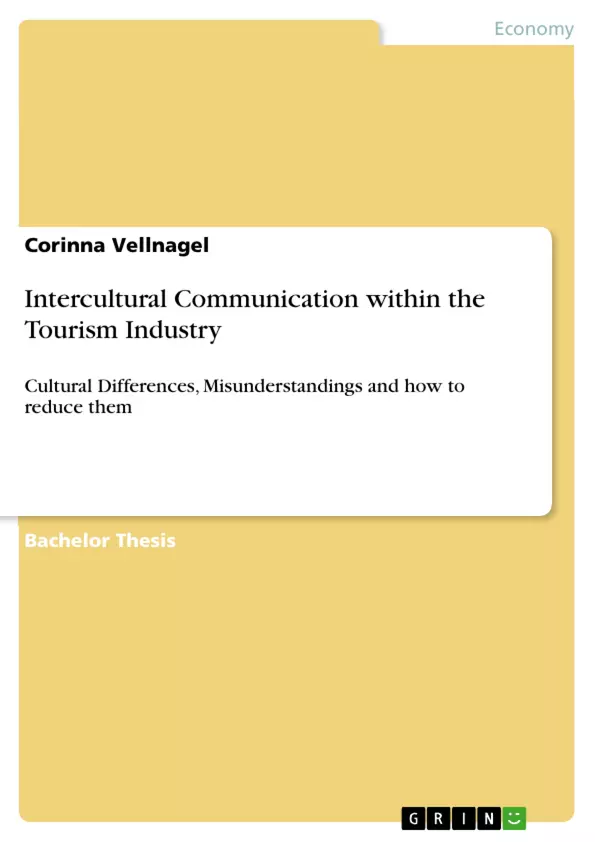
Intercultural Communication within the Tourism Industry
Bachelorarbeit, 2010
151 Seiten, Note: 2,0
Leseprobe
Inhaltsverzeichnis (Table of Contents)
- Introduction
- Problem and Research Question
- Research Objectives
- Structure and Content
- Culture and its Implications
- Definition
- Cultural Dimensions
- Kluckhohn and Strodtbeck's Cultural Dimensions
- Hall's Cultural Dimensions
- Hofstede's Cultural Dimensions
- Trompenaars' Cultural Dimensions
- Cultural Differences
- Communication and its Implications
- Definition
- Levels of Communication
- Verbal Communication
- Para-verbal Communication
- Non-verbal Communication
- Intercultural Communication
- History and Development
- Relevance
- Barriers to Intercultural Communication
- Intercultural Contact and Culture Shock
- Cultural and Communicational Problems in the Tourism Industry
- Surveys on Cultural Challenges occurring
- Empiric Approach
- Interviewees target group
- Research results concerning Intercultural Communication
- Analysis of the Employee - Employee Level
- Interviewees of Survey 1
- Attitude towards Work Flow
- Team
- Time
- Business meetings
- Communication
- Motivation and Aims
- Misunderstandings
- Analysis of the Host - Tourist / Guest Level
- Interviewees of Survey 2
- Tourist Behaviour
- Travel Motivation
- Social Contact for the Tourist
- Misunderstandings
- Preventing Cultural Discrepancies in a Tourism Enterprise
- Aims and Necessity of Compensation
- Methods
- Intercultural Training
- Culture-Assimilator
- Culture Awareness Training / Diversity Training
- Contrast Culture Training
- Intercultural Team-Building
- Language, Translation and Communication Training
- Intercultural Reintegration
- Critical Reflection
- Target Check
- Conclusion
- Cultural Dimensions and Their Impact on Communication
- Barriers and Challenges in Intercultural Communication within the Tourism Industry
- Empirical Research on Cultural Differences and Misunderstandings
- Strategies and Methods for Reducing Cultural Discrepancies in Tourism Enterprises
- Intercultural Training and Development Programs
Zielsetzung und Themenschwerpunkte (Objectives and Key Themes)
This bachelor's thesis delves into the realm of intercultural communication within the tourism industry. Its primary objective is to explore cultural differences and misunderstandings that arise in this sector and propose solutions to mitigate them. The work investigates the impact of cultural dimensions on communication and highlights the challenges faced by both employees and tourists in a diverse and globalized travel environment.
Zusammenfassung der Kapitel (Chapter Summaries)
The thesis begins with an introduction outlining the problem statement and research question, focusing on the significance of understanding and mitigating intercultural communication challenges in the tourism industry.
Chapter 2 provides a comprehensive definition of culture and explores various frameworks for understanding cultural dimensions. These frameworks, including Kluckhohn and Strodtbeck's, Hall's, Hofstede's, and Trompenaars' models, offer valuable insights into the diverse cultural values and perspectives that influence communication and interactions. The chapter concludes by examining the implications of cultural differences in communication and interpersonal relationships.
Chapter 3 delves into the intricacies of communication, providing definitions and exploring different levels of communication, including verbal, para-verbal, and non-verbal. This chapter also explores the concept of intercultural communication, its history, relevance, and key challenges. It further investigates the phenomenon of culture shock and its impact on intercultural encounters.
Chapter 4 focuses on analyzing cultural and communication problems within the tourism industry. It presents findings from empirical research conducted through surveys targeting both employees and tourists, highlighting common challenges and misunderstandings experienced in various aspects of the tourism experience, including work flow, team dynamics, business meetings, and interactions between hosts and guests.
Chapter 5 explores strategies for preventing cultural discrepancies in tourism enterprises. This chapter delves into the necessity of intercultural training and presents various methods, including culture-assimilator, culture awareness training, contrast culture training, and intercultural team-building programs. It also discusses the significance of language, translation, and communication training and the importance of intercultural reintegration for individuals returning from diverse cultural experiences.
Schlüsselwörter (Keywords)
The key terms and topics addressed in this thesis include intercultural communication, tourism industry, cultural dimensions, cultural differences, misunderstandings, intercultural competence, training programs, communication strategies, cultural awareness, diversity training, and culture shock.
Details
- Titel
- Intercultural Communication within the Tourism Industry
- Untertitel
- Cultural Differences, Misunderstandings and how to reduce them
- Hochschule
- Duale Hochschule Baden-Württemberg, Ravensburg, früher: Berufsakademie Ravensburg
- Note
- 2,0
- Autor
- Corinna Vellnagel (Autor:in)
- Erscheinungsjahr
- 2010
- Seiten
- 151
- Katalognummer
- V160357
- ISBN (eBook)
- 9783640742356
- ISBN (Buch)
- 9783640742684
- Dateigröße
- 2339 KB
- Sprache
- Englisch
- Schlagworte
- Intercultural Communication Tourism Industry Cultural Differences Misunderstandings Cross-Cultural Hospitality Culture Hofstede Hall Dimension
- Produktsicherheit
- GRIN Publishing GmbH
- Preis (Ebook)
- US$ 42,99
- Preis (Book)
- US$ 56,99
- Arbeit zitieren
- Corinna Vellnagel (Autor:in), 2010, Intercultural Communication within the Tourism Industry, München, Page::Imprint:: GRINVerlagOHG, https://www.diplomarbeiten24.de/document/160357
- Autor werden
- Ihre Optionen
- Vertriebskanäle
- Premium Services
- Autorenprofil
- Textarten und Formate
- Services für Verlage, Hochschulen, Unternehmen

- © GRIN Publishing GmbH.
- Alle Inhalte urheberrechtlich geschützt. Kopieren und verbreiten untersagt.
- info@grin.com
- AGB
- Open Publishing
Der GRIN Verlag hat sich seit 1998 auf die Veröffentlichung akademischer eBooks und Bücher spezialisiert. Der GRIN Verlag steht damit als erstes Unternehmen für User Generated Quality Content. Die Verlagsseiten GRIN.com, Hausarbeiten.de und Diplomarbeiten24 bieten für Hochschullehrer, Absolventen und Studenten die ideale Plattform, wissenschaftliche Texte wie Hausarbeiten, Referate, Bachelorarbeiten, Masterarbeiten, Diplomarbeiten, Dissertationen und wissenschaftliche Aufsätze einem breiten Publikum zu präsentieren.
Kostenfreie Veröffentlichung: Hausarbeit, Bachelorarbeit, Diplomarbeit, Dissertation, Masterarbeit, Interpretation oder Referat jetzt veröffentlichen!
- GRIN Verlag GmbH
-
- Nymphenburger Str. 86
- 80636
- Munich, Deutschland
- +49 89-550559-0
- +49 89-550559-10
- info@grin.com
-









